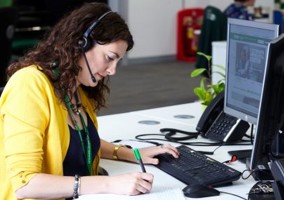When it comes to sector discussions about remote working, I find myself in a relatively unusual position. Unlike other charities, we have no office to return to and no plans to open one.
At the National Survivor User Network (NSUN), we have been remote working since 2018, although I was new to this way of working when I joined in January 2020. Over the past 18 months, we’ve scaled, and have moved from two members of staff with an associate team to a core team of seven. We’ve recruited from across the country, and we are continuing to grow.
I haven’t met anyone I’ve hired since last March face-to-face. I know what kind of films they like, but I don’t know how tall they are.
It’s been an intense, reactive year. It’s been difficult to carve out the space to write internal policies, let alone reflect on how to embed equity within them, or future proof decisions when the ground is shifting under my feet.
I am still figuring things out – but here is some of my emerging thinking on remote working, both for me and for NSUN.
Remote working is more work
If you’ve organised an online event in the past year, you’ll have probably found that it was more work than a face-to-face one. There’s more prep involved, tighter deadlines, more choreography.
It’s the same for day-to-day remote working. You have to create the space for those informal interactions. As we have learnt the hard way through Zoom fatigue, you can’t just transpose face-to-face meetings to online spaces.
So we’ve tried to switch things round. We use WhatsApp for all the stuff that happens outside of email and meetings – informal catch-ups, shooting across ideas, checking things out.
Using WhatsApp for work didn’t come easily to me. I had all sorts of worries about boundaries, and (legitimate) fears about a slow death by gif. But actually, I wasn’t the only one. People have been really thoughtful and respectful: it turns out no one wants to get 100 notifications an hour.
It doesn’t have to be WhatsApp, of course. But there is something about it not being just email and Zoom and Trello.
I’ve been picking up the phone more, too. We have drinks/take-out online every few months. This is all part of what has made work feel so warm and solid over the past year.
Remote working doesn’t mean no more offices
Three charities and collectives in London, Leeds and Brighton have generously offered us pro bono office space, so that team members who want to can spend one day a week in an office, with other people.
We’ve had to think about fit and availability, but also some practical questions: connectivity (do the office spaces include good WiFi?); insurance for people’s laptops; and whether we can cover travel to the office (probably not, as it’s likely to be considered a permanent workplace for one day a week).
Is this sustainable? I don’t know.
As we all move into hybrid working, I think the demand for meeting space will exceed the supply of good, cheap rooms for a while. And people’s expectations will have changed: we may all start looking for higher spec spaces to meet. But sharing space with others feels really sensible and generative, and something I want to continue to explore.
Remote working should not be about the employer saving money
We’ve recently updated our working from home policy, and this has brought up a number of questions about our duties as an employer.
From fairly early on in the pandemic, and at the discretion of the trustees, we have been able to offer all staff the £26 per month Working from Home allowance which is meant to cover some of the additional costs of working from home.
Of course, we check people’s IT and access needs and cover these as we would in an office. We’ve looked at insurance, and whether employees should be liable for their own insurance to cover work equipment at home. (Probably not, but finding insurance for this has not been straightforward.)
And then there is health and safety. As employers, we have a duty to ensure, so far as it is reasonably practicable, the health, safety and welfare at work of all staff.
I wonder how many charities have conducted risk assessments for their staff working from home in the past year.
The reality is that home working costs – in heating, WiFi, or equipment – and that burden is more often than not falling on the employee. We cannot push forward with remote working or hybrid working without thinking about equity, and how the material conditions of our lives will shape our experience of working from home.
I’m ambivalent about working in an office. I have children, I don’t have a social life after work, I have commuted enough. But I’m also in the exceptionally fortunate position of having a room I can work in which isn’t the room I sleep in.
This wouldn’t have been the case for me when I first started work. Charities cannot base their working from home policy based on what works for the people it already works for.
I don’t yet know things will pan out for us, but I suspect that more charities will move towards a working from home allowance, which employees then have the flexibility to spend on renting desk space, or setting up or renovating a home office space.
Remote working brings other pressures
For many of us, the boundaries between home and work have collapsed. This is amplified in mission-driven charities, where overwork can be glorified.
We’ve tried to address this in a few ways.
We’re reviewed our TOIL policy. We are closing the office for one week in August and one week over Christmas this year, in addition to annual leave. I’ve moved to compressed hours over 4 days a week; everyone else is 4 or 3 days a week.
And I am trying to listen to the people in my team and address some deep-seated work habits. I don’t want my team to burn out, like I have, in the past.
It feels really important to me that the social change we talk about as an organisation is also embedded into our policies and processes. I want to build scaffolding which feels solid for me and the team, but also offers us the possibility of creating different structures.
I think there are other, better ways of working than those which have been handed down to me.
Like so many leaders, I would like to figure out what they are and how we might get there.
Akiko Hart is chief executive of the National Survival User Network, which brings together individuals and groups with lived experience of mental ill-health, distress and trauma.
Related news












